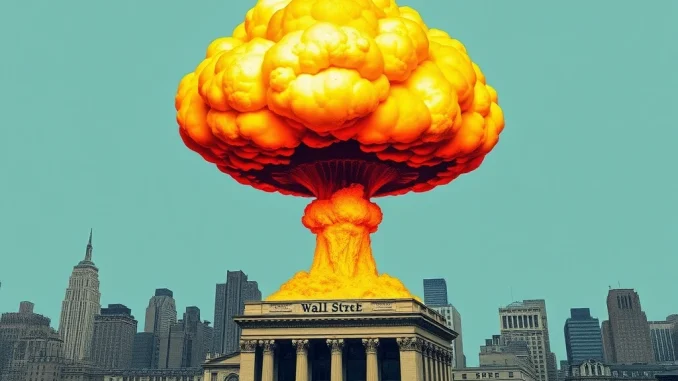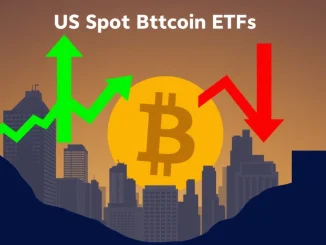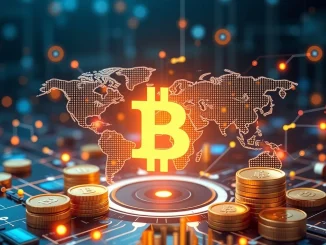
In a striking statement that has sent ripples through financial circles, billionaire hedge fund manager Bill Ackman has likened the ongoing U.S. tariff disputes to an “economic nuclear war.” This bold assertion, made on social media platform X, paints a grim picture of the current economic landscape and raises serious questions about the long-term consequences of protectionist trade policies. Are we truly on the brink of an economic meltdown, or is this an overblown reaction to necessary trade adjustments? Let’s delve into Ackman’s perspective and understand the potential ramifications of escalating tariffs.
Is the U.S. Engaged in an Economic Nuclear War?
Ackman’s choice of words – “economic nuclear war” – is deliberately provocative. It’s designed to grab attention and underscore the severity of his concerns. But what exactly does he mean by this dramatic comparison? He argues that while there might be popular support for President Trump’s tariff initiatives, the reality is far more damaging. Instead of strengthening the U.S. economy, Ackman believes these tariffs are unleashing a destructive force, eroding America’s standing in the global marketplace.
Here’s a breakdown of Ackman’s core arguments:
- Credibility Crisis: By aggressively imposing tariffs, the U.S. risks losing its reputation as a reliable trading partner. Businesses thrive on stability and predictability. When trade policies become erratic and weaponized, it breeds uncertainty and distrust.
- Investment Freeze: No company, whether domestic or international, wants to make substantial investments in a nation embroiled in an “economic nuclear war.” The fear of escalating trade tensions and retaliatory measures stifles capital expenditure and long-term growth.
- Market Instability: Tariffs disrupt supply chains, increase costs for businesses, and ultimately lead to higher prices for consumers. This volatility can trigger a market crash as investors become jittery and pull back from risky assets.
The Domino Effect: How Tariffs Can Trigger a Market Crash
Ackman outlines a concerning domino effect that starts with tariffs and culminates in a broader economic downturn. Let’s examine this sequence step-by-step:
- Tariffs are Imposed: The initial action is the implementation of tariffs on imported goods. This is often done with the intention of protecting domestic industries and reducing trade deficits.
- Increased Costs: Tariffs act as a tax on imports. Businesses that rely on these imports face higher costs for raw materials, components, or finished products.
- Price Hikes for Consumers: To offset increased costs, businesses are often forced to raise prices for consumers. This erodes purchasing power and can lead to decreased demand.
- Market Uncertainty and Crash: As costs rise and consumer spending potentially declines, investors become apprehensive. The stock market, a barometer of economic sentiment, can experience a significant downturn or a market crash as investors sell off assets.
- Investment Halt: In a climate of market crash and economic uncertainty, businesses become hesitant to invest in new projects, expansions, or even maintaining current operations at full capacity.
- Reduced Consumer Spending: Fearful of job losses and economic instability, consumers tighten their belts and reduce discretionary spending. This further dampens economic activity.
- Business Curtailment and Job Losses: Faced with declining demand and investment, businesses are compelled to cut costs. This often translates into reduced investment, hiring freezes, and ultimately, layoffs. Small and medium-sized enterprises (SMEs), often operating with tighter margins, are particularly vulnerable.

Impact on the US Economy: A Self-Induced ‘Economic Nuclear Winter’?
Ackman warns that if President Trump does not reconsider his tariff policy, the U.S. is heading towards a “self-induced, economic nuclear winter.” This stark phrase evokes images of a prolonged period of economic stagnation and decline. The core concern is that these policies, intended to strengthen the US economy, are actually undermining its foundations.
Key Challenges Posed by Tariffs to the US Economy:
| Challenge | Description |
|---|---|
| Supply Chain Disruption | Tariffs disrupt established global supply chains, forcing businesses to find new sources, often at higher costs and with less efficiency. |
| Retaliatory Tariffs | When the U.S. imposes tariffs, other countries often retaliate with their own tariffs on U.S. exports. This harms American businesses and farmers who rely on international markets. |
| Reduced Competitiveness | Higher input costs due to tariffs can make U.S. businesses less competitive in the global market, both domestically and internationally. |
| Inflationary Pressure | Tariffs contribute to inflation by increasing the prices of imported goods, which can ripple through the entire economy. |
| Damage to International Relations | Aggressive tariff policies can strain relationships with key trading partners, undermining diplomatic and economic alliances. |
Trade War Escalation: Are We on the Brink?
The term “trade war” is frequently used in discussions about tariffs. It refers to a situation where countries engage in escalating rounds of tariff increases and other trade barriers in retaliation against each other. Ackman’s “economic nuclear war” analogy suggests that he believes we are already in or rapidly approaching such a trade war scenario. The danger is that once a trade war begins, it can be difficult to de-escalate, leading to prolonged economic damage for all parties involved.
Potential Escalation Points in a Trade War:
- Increased Tariff Rates: Countries can progressively raise tariff rates on a wider range of goods, making trade increasingly expensive and restrictive.
- Non-Tariff Barriers: Beyond tariffs, countries might implement other trade barriers, such as stricter regulations, quotas, or import licenses, to further limit trade.
- Currency Manipulation: In a trade war, countries might manipulate their currencies to gain a competitive advantage, further destabilizing global markets.
- Geopolitical Tensions: Economic disputes can spill over into broader geopolitical tensions, exacerbating international conflicts and instability.
Ackman’s Urgent Call to Action
Bill Ackman’s message is a clear and urgent call for President Trump to reconsider his tariff policy. He believes that the current course of action is unsustainable and will lead to severe economic consequences for the US economy. Ackman emphasizes that voters did not elect President Trump to preside over an “economic nuclear winter.” He urges a shift towards more constructive trade policies that foster international cooperation and economic growth, rather than protectionism and conflict.
Conclusion: Avoiding Economic Self-Destruction
The debate surrounding tariffs and trade wars is complex and multifaceted. While some argue that tariffs are necessary to protect domestic industries and address unfair trade practices, voices like Bill Ackman’s raise serious alarms about the potential for widespread economic damage. His dramatic “economic nuclear war” analogy serves as a stark reminder of the high stakes involved. Whether or not his prediction of an “economic nuclear winter” comes to pass remains to be seen, but his warning underscores the urgent need for careful consideration and responsible policymaking in the realm of international trade. The global economy is interconnected, and actions taken by one nation can have far-reaching and often unintended consequences for all.



